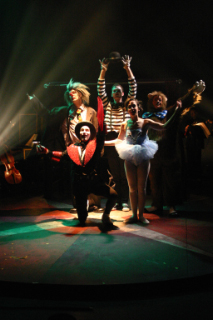Handel Meets the Big Top
 American Opera Theater, the inventive company formerly known as Ignoti Dei Opera, have mounted two interesting productions reviewed here at Ionarts last season. First it was the North American premiere of Cavalli's La Didone, followed by an all-original theater work called Ground that uses 17th-century ostinato bass pieces. Now the newly rechristened company brings us Handel's comic masque Acis and Galatea (1718) in a production that will sound absolutely crazy -- and is at least somewhat crazy -- but that was, once again, of profound interest.
American Opera Theater, the inventive company formerly known as Ignoti Dei Opera, have mounted two interesting productions reviewed here at Ionarts last season. First it was the North American premiere of Cavalli's La Didone, followed by an all-original theater work called Ground that uses 17th-century ostinato bass pieces. Now the newly rechristened company brings us Handel's comic masque Acis and Galatea (1718) in a production that will sound absolutely crazy -- and is at least somewhat crazy -- but that was, once again, of profound interest.
In the original libretto, John Gay, Alexander Pope, and John Hughes (all members of the Scriblerus Club -- not a bad writing team) set the mythological story (used in several other operas) against a background of shepherds and shepherdesses. In this production at Baltimore Theater Project, director Timothy Nelson and lighting and production designer Kel Millionie have recast the music for a group of sideshow misfits -- "a traveling troupe of singing circus folk" as they put it in the program notes. Galatea (soprano Rebecca Duren, who sang a number of roles, including a young boy, in La Didone) becomes a tightrope ballerina, the Trapeze Girl. Her beloved Acis (tenor Aaron Sheehan, who was Enea in La Didone) is a mime in striped shirt and face paint. The cyclops Polyphemus (bass Sumner Thompson) becomes the Sad Clown, with a huge tie, bright red nose, crazy wig, and perpetually sour face.
Tim Smith, Opera flies high (Baltimore Sun, January 18) Clayton G. Koonce, American Opera Theater's "Acis and Galatea" (Operatically Inclined, January 20) |
In Ground, the texts that were sung did not match the action on stage, but it was in Italian and no one cared much (including me). Here, the singers declaim in English and the action has even less to do with the libretto. Until the end, that is, when the silliness finally stops and Polyphemus kills Acis with a large rock (well, a pink ball). There is no getting around that tragic ending. I spent the first fifteen minutes or so of the first half thinking that I would leave at intermission. The chorus sings, "Oh, the pleasure of the plains," and Galatea sings, "Ye verdant plains and woody mountains" and "Hush, ye pretty warbling choir." None of this has anything to do with the circus, and at first it all seemed a grotesque distortion of a gorgeous piece of music.
 Cast of Acis and Galatea, American Opera Theater, photo by Greg McLeskey |  Rebecca Duren as the Trapeze Girl (Galatea), American Opera Theater, photo by Greg McLeskey |
There is no point in pretending that this makes any sense. It turns the plot into a muddle and may annoy a viewer who is familiar with the work. However, if you accept that you are not going to be watching Handel's masque, but instead watching something else to the accompaniment of Handel's music, this production is a lot of fun. All of the singing is fine, and in this intimate theater the listener can hear each voice clearly, even in the choral numbers (especially when, at one point, the cast walks up into the seating and serenades individual members of the audience). I have rarely heard an audience laugh out loud this much at the opera.
Remaining performances at Baltimore Theater Project are this Thursday, Friday, and Saturday (January 25 to 27, 8 pm). American Opera Theater will then take the production on tour through the Midwest with performances at the Buskirk Chumley Theater in Bloomington, Ind. (February 7), the Old Centrum Theater in Indianapolis (February 8), the Ruth Page Center for the Arts in Chicago (February 9), and the Marcus Center for the Arts in Milwaukee (February 11).
The next opera production at Baltimore Theater Project will be Benjamin Britten's Rape of Lucretia, recently discussed at Ionarts, by the Peabody Chamber Opera (February 2 to 4).





















































1 comment:
I also had to let this production concept sink in before I was really enjoying it. In the end, it was all beautifully done. I heard from the director that they will give a concert peformance (without the circus) somewhere in Georgetown soon, but I'm waiting to get details about that.
Post a Comment